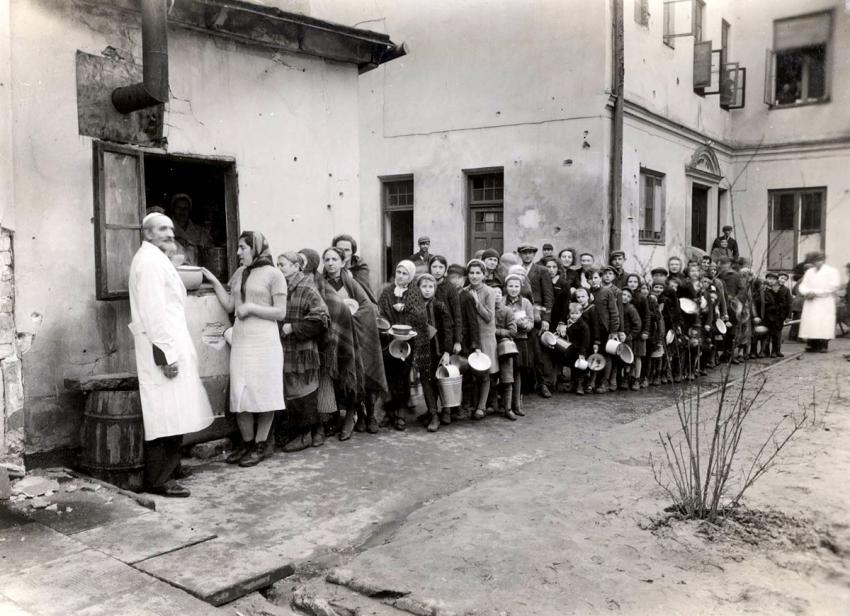
Jewish refugees waiting in a soup line at a shelter at 33 Nalewki Street
Yad Vashem Photo Archives, 33/1867
When the battles of World War I came to an end, humanity hoped that never again would another world war erupt.
That hope was crushed on 1 September 1939, when the German Army invaded Poland. Five years later, in 1944, while hiding in a town in Polish Galicia, Dr. Baruch Milch wrote in his diary, “On Friday, 1 September 1939, the day World War II broke out, my real life began to end. The events of that day, and everything that happened in the ensuing days and years, will be remembered to the world's eternal shame for as long as mankind endures. One day, when we tell our children and grandchildren what happened to us, they will find it hard to believe that human beings could endure such agonies. If such stories are true, they will think, then the world must end.” 1
World War II was the largest, broadest and deadliest war in human history. At its height, it raged from one end of the world to the other, traversed continents and oceans, and impacted nearly every nation on earth. Tens of millions of people died, most of them unarmed civilians. Violence and death cast their heavy shadow over humanity, diminishing its ability to recognize and deal with a heretofore inconceivable moral collapse.
It was in this battered and indifferent world that Nazi Germany sought to annihilate the Jewish people. Nazi ideology was based on an extreme racist antisemitic worldview that considered Jews a destructive race that was poisoning and undermining the very foundations of human existence. Within two years of the outbreak of war, Nazi Germany had taken control of most of Europe and North Africa. Its military achievements enabled Germany to implement the Nazi "vision" of a world without Jews. The "Final Solution" could not have been carried out other than in the context of a world war. The Nazis strove to obliterate Judaism as a religion and a culture, to eradicate the Jewish people and to wipe every Jewish man, woman and child off the face of the earth. For the Jewish people, the front lines of the war determined the boundaries of their persecution, oppression and murder.
Across occupied Europe, Jews attempted in various ways to join in the armed struggle against the German Nazis and their accomplices, including by joining partisan fighters and establishing Jewish underground groups. One-and-a-half million Jews enlisted in the Allied armies and served actively in the war.
During World War II, the Jews in the German-occupied territories had to struggle, both as individuals and collectively, for their very existence and for the survival of their family members and fellow Jews. They risked their lives in frequent acts of solidarity and aid for their persecuted brethren. The struggle for physical survival under the terror of Nazi German rule entailed hiding and escape, smuggling food, administering aid and social welfare, and providing medical care. Jews in underground movements all over Europe attempted to organize a wide range of rescue efforts, in order to save as many other Jews as possible.
All the while, they persisted in their struggle to preserve their Jewish identity, culture and religion. Jews in the ghettos initiated clandestine educational activities, published underground newspapers, and conducted extensive and varied political activities. Observant Jews fought for communal survival, whether by gathering in prayer quora (minyanim), or by adhering, even symbolically, to the rhythm and highlights of the Jewish calendar, even in concentration camps. Jewish music continued to be played in concerts organized by culture committees in the ghettos or in the forests, with musical instruments taken on the run. Drawings, songs and stories were created and hidden away for posterity. Thus, they sought to remember the past, feel the pain of the present, and dream of the future.
Remembrance through drawing, personal memoirs and documentary writing played an important role in the Jews' battle to maintain their human dignity, even on the verge of death. It was a battle for memory, a war against forgetfulness and deception. In the words of author and Holocaust survivor Aharon Appelfeld in an address at Yad Vashem on the eve of Holocaust Remembrance Day in 1997, "The diaries written during the Holocaust are undoubtedly the most scorching outcries ever expressed by the human soul. These cries were uttered by people of different ages, and different degrees of religious faith or secularity. This was their final attempt to preserve their identity before it was seized from them.”
- 1. Milch, Baruch, Can Heaven Be Void? (Trans. Helen Kaye, ed. Shosh Milch-Avigal) (Jerusalem: Yad Vashem, 2003), p. 55.
